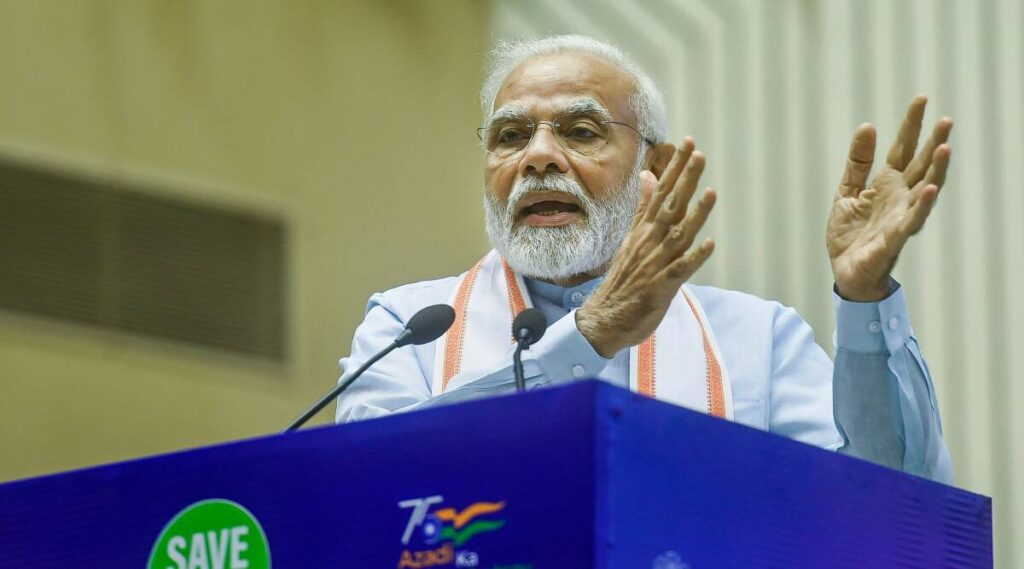Speaking on World Environment Day, Prime Minister Narendra Modi said that while the global average for carbon emissions per person is four tonnes, for Indians it is only around half a tonne per year.
India has achieved the target of blending 10 per cent ethanol in petrol five months ahead of schedule, resulting in less carbon emissions, more savings for the country and better income for farmers, Prime Minister Narendra Modi said on World Environment Day and mentioned that in 2014 only 1.5 per cent ethanol was blended in petrol in India.
The Prime Minister was delivering a speech at Save Soil Movement, an event organised by Sadhguru Jaggi Vasudev’s Isha Foundation. Modi also listed out several environmental measures taken by his government over the last eight years.
He mentioned that the 10 per cent ethanol blending target has resulted in three major advantages. First, it has resulted in the reduction of 27 lakh tonnes of carbon emissions; second, Modi added, India has managed to save over Rs 41,000 crore over an eight-year period; and lastly, “the farmers of the country have earned more than Rs 40,000 crore” during this period.
India is also working towards minimising its dependence on fossil fuels, Modi said. “To meet our energy needs from renewable sources, we are working on increasingly bigger goals. We had set a target of achieving 40 per cent of our installed power generation capacity from non-fossil fuel based sources. India has achieved this target 9 years ahead of schedule.” He said today our solar energy capacity has increased about 18 times.
India is also working towards green jobs, he said, which is rarely discussed. “The way India is taking decisions in the interest of the environment and implementing them rapidly, they are also creating a large number of green job opportunities. This is also a subject of study that should be thought about.”
While the global average for carbon emissions is four tonnes per person, Modi said, the per capita carbon footprint for Indians is only around half a tonne per year. “Despite this, India is working towards the environment with a holistic approach, not only within the country but also by engaging with the global community,” he pointed out and mentioned that “India has also resolved… (to) achieve the target of Net Zero by the year 2070.”

*The country is working on a long-term vision, along with the international community, to protect the environment and has established organisations like the Coalition for Disaster Resilient Infrastructure and International Solar Alliance. Further, to conserve soil, Modi said the government is focusing on a five-pronged approach – by making it chemical-free, saving the organisms in it, maintaining soil moisture, increasing water availability and removing the damage that happens to the soil due to less groundwater, and by stopping continuous erosion due to reduction in forest cover.
Speaking on the agricultural policy, Modi said earlier farmers lacked information about the type of soil they were working on and its deficiencies. “To overcome this problem, a huge campaign was launched to give soil health cards to farmers in the country.” He said over 22 crore soil health cards have been given across the country, and a huge network for soil testing has also been created.
Today, Modi said, “crores of farmers of the country are using fertilizers and micro-nutrients on the basis of information received from the Soil Health Card” which has resulted in saving 8 to 10 per cent in cost to farmers and an increase of five to six per cent in yield.
Natural farming, he said, is a “great solution to our challenges today” and the government will encourage it in villages situated on the banks of the Ganga and “build a huge corridor for natural farming… our fields will not only be chemical-free, the Namami Gange campaign will also get new strength. India is also working on the target of restoring 26 million hectares of barren land by 2030.”
Newsletter | Click to get the day’s best explainers in your inbox
PM Modi also mentioned that in March a campaign to conserve 13 big rivers was launched in the country and, along with reducing the pollution of water, work is also being done to plant forests on the banks of rivers. It is estimated that this will increase forest cover in India by more than 7,400 sq km, in addition to the increase of over 20,000 sq km since 2014.
“The policies related to biodiversity and wildlife which India is following today have also increased the numbers in the wild by a record. Today whether it is tiger, lion, leopard or elephant, their numbers are increasing,” Modi stated.
Under the PM-National Gati Shakti Master Plan, he said, the logistics system in the country will become modern and the transport system will become stronger. He said for multimodal connectivity in the country, over 100 waterways are being worked on to protect the environment and tackle the challenge of climate change.

Source:indianexpress.com

